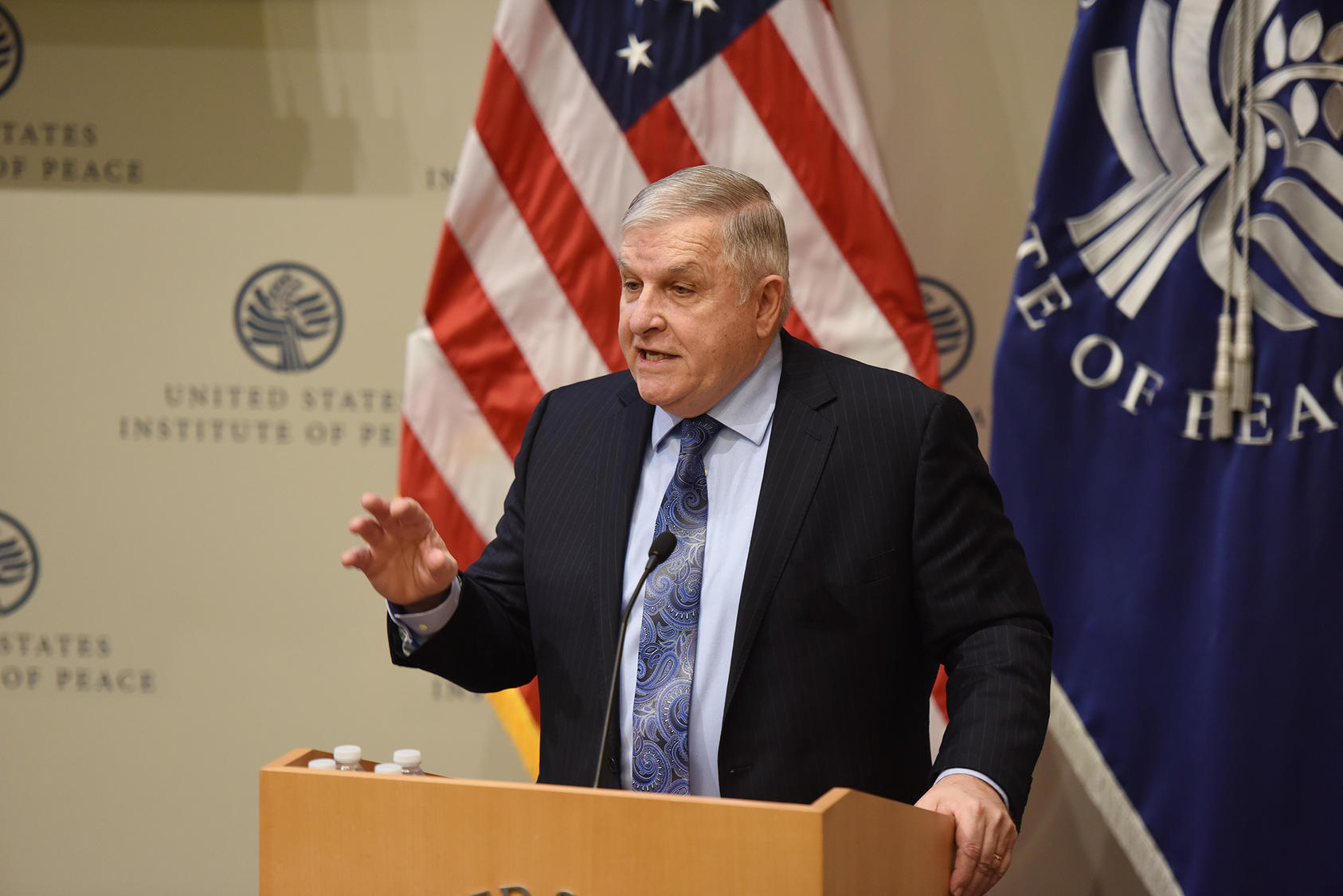 A string of vehement crises since the 1990s—from Somalia to Republic of Iraq to others—has underscored America’s ask to coordinate meliorate amidst military machine forces, relief as well as evolution organizations, diplomats as well as other responders, retired Marine Corps General Anthony Zinni said this week. The U.S. should regard creating a standing “interagency command” for such crises, Zinni told listeners at USIP.General (Ret.) Anthony Zinni at the U.S. Institute of Peace, Oct 24, 2018.
A string of vehement crises since the 1990s—from Somalia to Republic of Iraq to others—has underscored America’s ask to coordinate meliorate amidst military machine forces, relief as well as evolution organizations, diplomats as well as other responders, retired Marine Corps General Anthony Zinni said this week. The U.S. should regard creating a standing “interagency command” for such crises, Zinni told listeners at USIP.General (Ret.) Anthony Zinni at the U.S. Institute of Peace, Oct 24, 2018. Zinni, who headed the U.S. Central Command from 1997 to 2000 as well as afterward served every bit the U.S. special envoy for Middle East peace, spoke to PeaceCon 2018, a gathering of the peacebuilding community. USIP as well as the Alliance for Peacebuilding convene the conference each twelvemonth amidst conflict resolution specialists, diplomats, scholars, military machine strategists as well as others. Many such conferences, Zinni noted, repeatedly convey declared America’s ask for meliorate coordination of its governmental as well as non-governmental responses to crises from Transitional Islamic State of Afghanistan to Syrian Arab Republic to Great Socialist People's Libyan Arab Jamahiriya as well as elsewhere.
A U.S. Interagency ‘Crisis Command’?
“So, I’m going to compass you lot a proposed solution,” Zinni told the group. “I’m going to tell nosotros ask to create an interagency command” to create produce America’s response to complex or “hybrid” safety crises.
“I loathe to usage that word, ‘command,’ because I don’t hateful it to hold upwards military,” he said. In his conception, “this organisation would hold upwards interagency. It would convey a State Department component, would convey a USAID component. It would hold upwards able to interact alongside NGOs [non-government organizations]. It mightiness fifty-fifty convey a representation from NGO organizations.” Its coordinating purpose would hold upwards analogous, he suggested to “our regional combatant commands, that convey components—Army, Navy Air Force, Marine Corps.”
Such a complex-crisis ascendency would acquit “organization, training, coordination [and] planning” amidst U.S. crisis responders as well as would hold upwards “a deployable entity,” Zinni said. So, if U.S. forces are required to deploy, every bit a decade agone “into an Republic of Iraq or an Afghanistan, you’re non … scratching your caput inwards Baghdad as well as Kabul as well as saying, ‘Now what’?
“This organisation would convey the ‘Now what?’ answer,” Zinni said. “It’s non going to hold upwards a pickup squad similar CPA [the Coalition Provisional Authority prepare past times the U.S. authorities inwards Republic of Iraq next its 2003 invasion] or ORHA [the Office for Reconstruction as well as Humanitarian Assistance], or whatever nosotros throw together at the in conclusion minute, alongside people unfamiliar alongside the situation.”
A Lesson from Somalia
In the absence of a broad, standing, interagency capacity to create produce complex crises, Zinni noted that the U.S. military machine is oftentimes sucked deep into the gap. He recalled leading U.S. Marines into the chaotic, collapsed solid soil of Somalia inwards 1992. “We were told that nosotros were but going in that place for almost 2 weeks” to suppress attacks on humanitarian operations past times warlord-led militias, he said.
But no project design or capacity existed to build on the Marines’ attempt alongside a broader stabilization effort. “I realized this almost iii days into the operation,” Zinni said, when a grouping of somali leaders “wanted to meet me, … as well as they were putting their finger inwards my confront as well as saying, ‘When are you lot going to kickoff the jobs programme here?’”
The Marines’ mission expanded into “running the police describe force” as well as trying to aid diplomats re-establish the government, Zinni said. His ain plough to a career inwards conflict resolution began on that mission nether the mentorship of Ambassador Robert Oakley, he said. That U.S. as well as international attempt to stabilize Somalia ended inwards 1993 next the costly Battle of Mogadishu betwixt U.S. as well as international troops, as well as somali militia. The mission was recounted past times Oakley as well as others inwards a USIP-published history, Somalia as well as Operation Restore Hope.
To Build Peace, Do the Research
Zinni has specialized inwards peace mediation projects since retiring from the military. “I finally did nine of these things, as well as I went off as well as got a master’s score inwards mediation as well as dispute resolution as well as negotiations,” he said. His move has included heading U.S. peace efforts inwards the Middle East, as well as missions to Indonesia, African nations as well as the Philippines.
A critical ask inwards whatever crisis, Zinni said, is inquiry on the precise contours of the conflict. “The splendid NGOs nosotros convey out in that place … render approximately of that research,” he said, every bit does the U.S. Institute of Peace, alongside which Zinni worked inwards his Philippines mission. “When nosotros did mediation move inwards the Philippines, the background information, the inquiry that nosotros came hither to larn … was exceptional.”
Zinni urged the PeaceCon participants, “Don’t walk away from the conference without an idea” almost how to reach the meliorate coordination that many conferences as well as analyses convey agreed must hold upwards achieved. “How produce nosotros construction this thing? How are nosotros going to fund it? Who should? How produce nosotros interact alongside others, from a U.S. perspective?”
“We convey the parts,” Zinni said. “We’ve never glued it together.”
Buat lebih berguna, kongsi:
